Opinion
Undignified Silence On Looters’ Identities
The Federal High Court order on the Federal Government to make public, information about public officials who allegedly looted government’s treasury, seems to be one of the news Nigerians have been yearning for.
Many have tagged it a welcome relief and a plus for democracy, having waited since May 2016, on the Federal Government to do the needful. It is, indeed, the only way of making the loot recovery process more transparent, especially coming from an administration which professes zero tolerance for corruption.
Justice Hadiza Shagari of a Federal High Court in Lagos had earlier in the month, in a suit filed by a civil society organisation, Socio Economic Rights and Accountability Project (SERAP), against the Federal Government, demanded that the latter makes public, information on the identity of suspected public officials involved in looting government’s treasury.
Hadiza’s judgement is coming on the heels of claims by the government that the Economic and Financial Crimes Commission (EFCC) actually recovered huge sums of ‘stolen’ money from some public officials but had refused to release names of suspected looters as well as other relevant information about them. Many Nigerians have, however, faulted this claim, questioning whether the EFCC is a distinct body from the Federal Government.
Of course, Nigerians can not be fooled all the time by politicians, certainly not in an era of freedom of information. Granted that a suspect remains innocent until proven guilty by a court of competent jurisdiction, Nigerians are not demanding for suspected looters’ identity as ‘confirmed looters.’ Rather, they want to know who the alleged looters are and how much they have refunded.
Reasons abound why suspected looters’ identities must be made known publicly. The public needs to be aware of such personalities so as to be careful of them until they are otherwise proven by court of competent jurisdiction. Publication of corrupt government officials’ identity generally will go a long way in checking corrupt practices in our political system. It will keep players on their toes as they become wary of acts capable of jeopardizing their political and social integrity.
Justice Shagari, by her judgement, has simply stated the obvious and by extention, expressed neutrality in a fight against corruption. A step very few Nigerians can take.
Going by the judgement, the Federal Government has a legally binding obligation to tell Nigerians the names of all suspected looters of the public treasury, past and present. The public could not have been said to be demanding so much, after all, it is their right.
Although the judgement reads that the government should immediately release to Nigerians information about the names of high-ranking public officials from whom public funds were recovered, as well as the exact amount of funds recovered from each, nothing tangible seems to have come from the Federal Government so far. The government is rather dishing out the same music the public is used to.
The Minister of Information and Culture, Alhaji Lai Mohammed, has continued to bore his listeners with his suspended narrative, as he constantly re-echoes the various amount of funds retrieved, as well as the much that the Federal Government anticipates to repatriate from foreign countries. He has also announced the non-cash recoveries, which included farmlands, completed and uncompleted buildings, vehicles and maritime vessels.
I think the court’s judgement on the issue is clear enough to be understood by the executive. This merry-go-round on issues that are obvious has not helped the country in the past, and so has outlived its usefulness in the present.
Nigerians would rather want President Muhammadu Buhari and his Vice, Prof. Yemi Osinbajo, to live up to their words that “we will do everything within the law to ensure full compliance with this landmark judgement”.
However, the words of the Minister of Justice and Attorney-General of the Federation (AGF), Abubakar Malami, in this regard, leaves much to be desired. Abubakar Malami had said “the government has agreed to publish the information but only after it has fulfilled judicial principles”.
Carefully choosing his words, he said, “the issue that is fundamentally worthy of consideration, is the fact that the government will ‘definitely’ be alive to its responsibility as far as those disclosures are concerned”.
He continued; “You have to take into consideration that there are a lot of factors that are to be considered as far as making those disclosures are concerned. So, the government will, at the appropriate time, make necessary disclosures, perhaps intermittently, against the background of the prevailing condition relating to the tendency of certain suits and associated things.”
Could Malami’s insistence on certain factors he considers fundamental in carrying out the court’s order, be signaling another violation of the rule of law by this administration?
Malami’s statement smacks of a government that is not ready to willingly respect the rule of law.
I pray this will not be another occasion to flout the law in the guise of fulfilling judicial principles. Nigerians would repose more confidence in this administration if it stands out in its fight against corruption by not shielding any ‘sacred cow’, and ensuring that looted funds are judiciously plunged back into the system.
Sylvia ThankGod-Amadi
Opinion
Balancing Religious Freedom and Community Rights

Quote:”Communities have rights to peace, safety, and quality of life. Noise pollution, crowds, or other impacts from religious activities can affect these rights. Balancing these interests requires consideration and dialogue”.
Opinion
Kids Without Play Opportunities

“All work and no play”, its said, “makes Jack a dull boy.” Despite this age-long maxim that recognises the role of play in early childhood development, play appears to be eluding many Nigerian kids. The deprivation of play opportunities comes in different forms for the Nigerian child depending on family’s social setting or status, but the effect is much the same. For children in Nigerian poor families, life is becoming as much a hassle as it is for their struggling parents. Due to harsh economic conditions, many families resort to engaging their kids prematurely in trading activities especially in hawking, to help boost family revenues, when these kids should be enjoying leisure after school. Some of these children barely attend schools while being forced to spend much of their childhood hustling in the streets. For children from well-off families, time could be as crunchy as it is for their busy parents when, obsessed with setting agenda for the future of their kids, parents arrange stringent educational regiment too early for their kids.
These group of children are made to get-off the bed by 5.30am every weekday, get ready for private school buses that call at 6.00am, otherwise report by however means to school at 7.20am.The situation is worse for kids in the city of Lagos where the need to beat urban traffic rush-hours is very high. Most children are further subjected to extra hours of lessons after school at 2.00pm, only to be released with loads of homework. On many occasions children who leave home for school at 6.30am get back by 3.30pm. With hardly enough time to eat, do school assignments and take afternoon naps, these children hardly had time for plays before dinners. In Nigeria, kids of ages between 3 and 12 spend averages of 9 hours a day and 45 hours a week to and from schools, and additional hours doing home assignments and domestic jobs, whereas their peers in developed countries spend about half that duration and have more time for leisure.
Any remaining spare time left after school work or street hustle is further stolen, when kids who usually are fascinated by gadgets, are exposed to household electronics like phones, tablets and gaming consoles. Electronic games may create a sense of leisure, but the difference with human interactions is that kids doing games interface mostly with machines or with programme structured in ways that entrap a child’s pysch directionally, according to the game’s programming, in ways that may not encourage independent thinking. Moreso, attraction to such gadgets displaces kids’ attention from important television and radio programmes. The prevalent tight, academic schedules for some Nigerian kids, though intended for academic excellence, encroaches on childhood leisure time needed to achieve an all-round childhood development, and could make children to resent formal education altogether. Besides, academic excellence or economic pursuit, is not all there is to living a well-nurtured life.
Children’s leisure time, defined as time left over after sleeping, eating, personal hygiene and attending school or day-care, is very crucial to childhood development. Sociologists recommend that children should have at least 40 per ceny of the day as leisure. According to Berry Brazelton, a former pediatrician at Harvard Medical School, “Play is the most powerful way a child explores the world and learns about him or herself.” Unstructured play encourages independent thinking and allows the young to negotiate their relationships with their peers, and in the process build self-confidence and self-control. Play is one of the important ways in which young children gain essential knowledge and skills. Leisure time enhances learning as fun enables children to learn at their own level and pace. Young children naturally explore and learn many skills by making cognitive connections from events that catch their attention.
Unstructured plays help children developed their cognitive, physical and communication skills that make them acquire social qualities necessary in navigating relationships in adult life. Plays enable children assess how others feel and learn perspectives as well as empathy through observing differences in facial expressions, body language and even tone of voice, which helps them copy how to express themselves to others, and therefore develop socially acceptable behavours that build relationships. In cooperative activities, children willingly take things in turn and may delegate roles. Children can also share the glory of winnings through competitive games, which is all great for working together in task sharing. Aside encouraging parents to ensure adequate leisure time for their kids at home, schools should make plays and exercises an integral part of the educational curriculum. The educational curriculum set by the Nigerian Educational Research and Development Council (NERDC) includes specific training durations and break periods, as well as sporting activities, as part of the school system.
Due to poor government funding, sports in public schools have declined, while most private schools lack sporting infrastructure or even play grounds. These make recreational activities and sports implementation almost impossible in schools. Also, the increasing rate of urbanisation in Nigerian communities is gradually eroding ancient playgrounds, while established urban centres have lost community playgrounds. With tightening apartment spaces now being the norm in most urban residential areas, many kids are forced to wriggle within burglary-proof enclosures. Nigerian governments and the relevant agencies should ensure that existing child labour protection laws, educational and urban development codes are implemented in the country, to enable proper nurturing of children as the future stakeholders of our society. Private schools, especially, should be supervised to ensure they follow the educational curriculum standards set by NERDC.
In a bid to impress parents and draw more patronage as better option than public schools, private schools, most of whom operate in cramped environments, have continued to set high regiments of training schedules beyond the capacity of most kids, and even encourage enrollment of pre-school age kids who can not sit still to listen for an extended periods of time. Schools, from creche to secondary levels, without playgrounds and recreational facilities should not be allowed to operate, and should be made to understand and implement appropriate curriculum and training durations. Many Nigerian kids, whether from rich or poor families, appear to have been set-up inadvertently, in the same leisure denial that affects their parents. All work and no play could lead to some messed-up kids who grow up not understanding social cues, and being unemotional and self-centered, manifest later as obsessive-compulsive adults.
By: Joseph Nwankwo
Opinion
Congratulations Fubara, Joseph Of Rivers State

We thank God who is above all human contrivance and arrogance. Congratulations, Your Excellency Amaopusenibo Sir Siminalayi Joseph Fubara. Your victory takes us back to the Bible as a living document of a God that rules in the affairs of all His creation. In a manner of speaking, welcome back from your first war with Phillistines, Your Excellency! Yes, first example is David and Goliath! And like David, Your Excellency stands over Goliath in victory. But that is not enough. Our real enemy is that Your Excellency is Governor of a State with a wretched economy. Indigenes of Your State are today reduced to battalions of beggars waiting for who will hire their loyalty on the usual “pay-as-you-go” basis.
Your Excellency, it brings us to another Bible- based parallel. Conscientious Rivers indigenes above 50, should identify with and commit our all to this second parallel. It is to liberate the economy and people of Rivers people from 23 years enslavement and poverty, for us to regain our dignity and pride. When the economy of Egypt was drifting into a disaster zone, even Pharaoh did not know it. He also did not know what to do. But God sent a Joseph to build the economy into a fortress of good fortune that overcame the economic and social disaster Egypt did not know was ahead. Your Excellency for 23 years, Rivers State has been ruled without any logical, credible and consistent PLAN of how to overcome mass poverty from our dehydrated local economies.
Your Excellency, Rivers State cannot survive one month without Federal allocation! So called IGR only about 10 per cent of Federal allocation.It is also not based on what we produce but on tax from other people’s productivity that pass through our State. Pharaoh did not know what to do in the case of Egypt. May it please God to position another Joseph in Governor Siminalayi Joseph Fubara to heal Rivers State and build an economy that all Africa will come to access in order to chart a new course out of worsening economic hardship that is caused by near zero investment in productivity and endemic reckless looting. They are the twin chambers nursing a corporate cancer unfolding across Nigeria and Africa. The hard work begins today, Your Excellency.
We need an economic blueprint that will enrich every Rivers senatorial district from investment to grow productivity and to enrich every Rivers person from career-based productive labour, just as Pharaoh was enriched by Joseph’s economic Blueprint. Let Rivers State stop the trend of waiting the lives of young Rivers people recruited by Phillistines into cultism, thuggery and easy money, as a career. These Phillistines believe they have only lost one phase of many legal battles and battles by other means. But from comments in the public media, their eyes are fixed on 4-years of war and more! Your Excellency, we the people will not let you forget what you owe us. We have to make unbelievers see that your leadership is different and that we are uprooting the old order of an unproductive Feudal System. That system makes a few persons and their cronies to monopolise our collective wealth, while the majority are left in misery. Let’s put an end to enslavement by cabals and mass poverty in Rivers State. That is when the Phillistines will surrender.
By: Amaopusenibo Brown
-

 Maritime5 days ago
Maritime5 days agoNCC Announces Telecoms Facilities Protection Measures
-

 Business5 days ago
Business5 days agoAON Lifts Ban On Freed Ibom Air Passenger
-
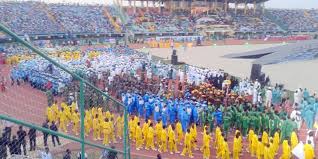
 Sports5 days ago
Sports5 days agoNYG:154 Nasarawa Contingent Storms Kwara For Zonal Eliminations
-

 Sports5 days ago
Sports5 days agoNathaniel breaks record as Amusan, Ofili clinch third
-
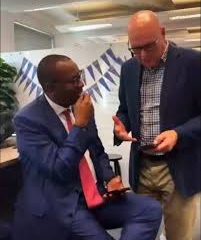
 Sports5 days ago
Sports5 days agoNigeria delegation Visits London over 2030 Commonwealth bid
-
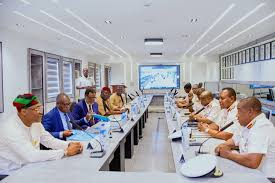
 Maritime5 days ago
Maritime5 days agoBureaucracy, Relationship Gaps, Bane Of Maritime Safety Investigation – NSIB
-
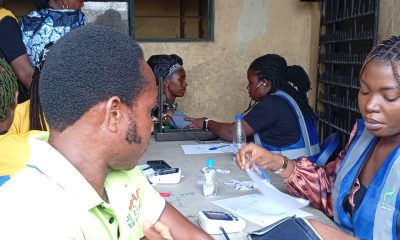
 News5 days ago
News5 days agoChurch Renders Free Medical Outreach, Others To Host Communities
-
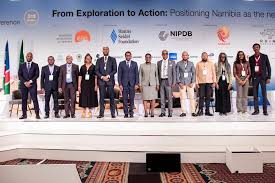
 Business5 days ago
Business5 days agoPETAN, Others Unveil ALCO, Get NCDMB’s Support … Mull Synergy With APPO, AU

